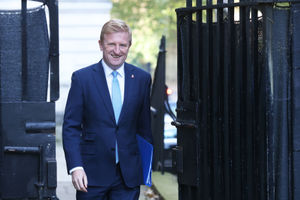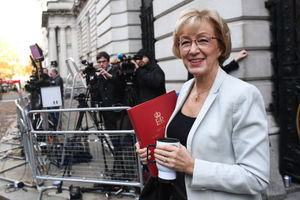Stay of execution for Paterson as Tories hit out at investigation
The vote not to suspend Owen Paterson means the North Shropshire MP now faces a wait to discover his fate.
Many considered that the vote to suspend Mr Paterson would have been a formality – as with previous standards sanctions imposed on MPs – but waves of support, first from backbench colleagues, then the Prime Minister himself saw the Conservative MP given a stay of execution over a bid to suspend him for 30 days.
The concerns raised by Mr Paterson and his supporters was that the process of an investigation into his lobbying had been pre-judged, had not interviewed his witnesses, and had no right of appeal.
During a 90-minute House of Commons debate on the matter, Chris Bryant, the chair of the parliamentary standards committee which had recommended Mr Paterson’s suspension, rejected those claims.
He said Mr Paterson’s name stood to become “a by-word for bad behaviour”.
Leader of the House of Commons Jacob Rees-Mogg had earlier said: “I do not come to defend the Rt Hon Member for North Shropshire but to consider the process by which he has been tried. It is not for me to judge him, others have done that, but was the process fair?”
He added: “Members must act when we see a process we believe is not compatible with natural justice.”


Ministers had placed Tories under a three-line whip to support the amendment tabled by former Commons leader Dame Andrea Leadsom, a senior Conservative MP told the PA news agency.
The division list showed 13 Tories voted against the Leadsom amendment, while a no vote was recorded by 98 others.
Some 246 Conservatives were listed as having voted for it, as was Rob Roberts, who lost the Tory whip after he was found to have sexually harassed a member of staff.
After the amendment was approved the final vote was carried by 248 to 221, and was met with cries of ‘shame’ as it was read out.
It has opened up a schism between the Tories and their political opponents, and means a review of Mr Paterson’s case, as well as the parliamentary disciplinary process for MPs.
As a result Mr Paterson faces a delay to find out whether he will be punished – or if he is exonerated.
During the debate Dame Andrea Leadsom said that “grave concerns” over the standards process need to be considered, adding her amendment was not about whether the report on Owen Paterson was correct or incorrect.
Accusations
She told MPs: “It is not about whether Mr Owen Paterson is innocent or guilty under that report.
“It’s not about letting anyone off, stitching anything up or any of the other accusations flying around the chamber.
“Today’s amendment is about the process of investigations into members and the question over whether this process must now be reviewed by a politically balanced select committee that will consider some exceedingly serious questions.”
Conservative MP for Stone, Sir William Cash, urged MPs to support Dame Andrea Leadsom’s “essential” amendment.
He said: “I simply make the point that where in courts or tribunals or provisional disciplinary arrangements, any person in the land will be able to apply for judicial review when there has been a failure to comply with such procedures, this does not apply because of parliamentary privilege because of Article 9 in the Bill of Rights.”
He added: “I believe that this amendment is essential and an investigatory panel should have been set up.”
Concluding the debate Mr Bryant described the charges as “very serious”, saying Mr Paterson “repeatedly, over a sustained period, lobbied officials and ministers on behalf of his paying clients”.
He said: “I have yet to meet a Conservative MP who has not said to me ‘he clearly broke the rules’. I think that includes the Leader of the House.”
Statements
Mr Bryant said Mr Paterson lobbied ministers in a way that conferred a direct benefit on his paying clients, which he said is “expressly forbidden, it is a corrupt practice”.
Mr Bryant said witness statements were considered, “we heard his appeal”, and “we gave him every opportunity to make his case to us”.
He said Mr Paterson “repeatedly failed to perceive his conflict of interest” and said “he has brought the House into disrepute”.
SNP Commons leader Pete Wishart had earlier told MPs he thought the amendment being considered by the Government was “some kind of joke” when he first saw it.
He said: “Today we have the full force of the Government whipping operation dragooning Conservative Members of Parliament through this House to overturn the decision of our standards committee and to introduce by a new way how we look and examine breaches of our rules in this House.
“It is almost outrageous in its suggestion.”
He accused the Government of “attempting to turn back the clock to the worst examples of 1990s Tory sleaze”. The vote could create a further political headache for the Conservatives with suggestions that opposition parties will refuse to serve on any new standards committee - leaving the impression of MPs ‘marking their own homework’.
During the debate Mr Wishart had said: “The Scottish National Party will not serve on any kangaroo court designed and determined by this party in order to do away with an independent process for looking at the breach of the rules.”
At the conclusion of the debate former Shadow Chancellor John McDonnell said no MP would be ‘truly honourable’ if they sit on the committee.





